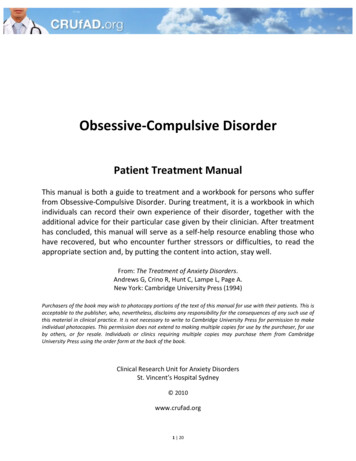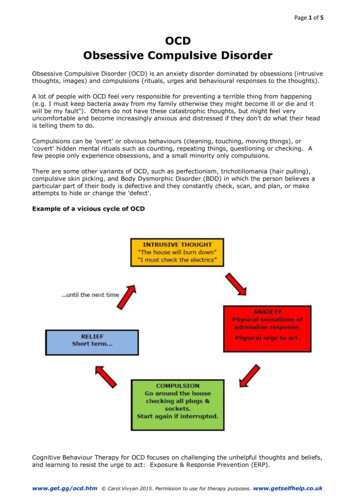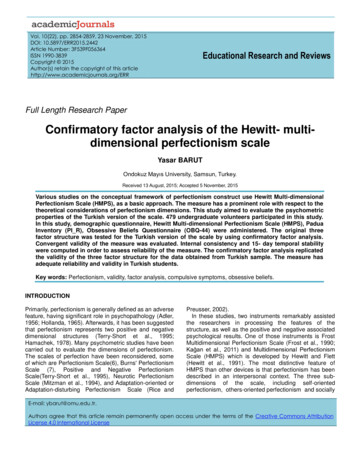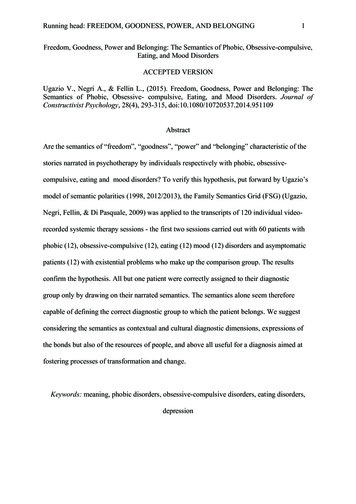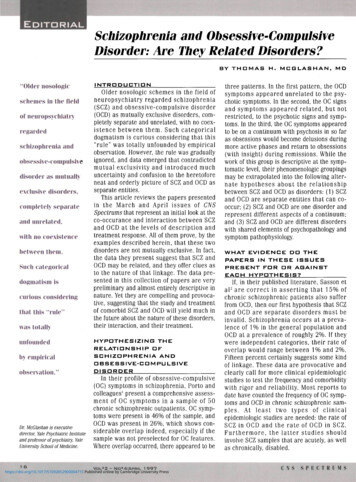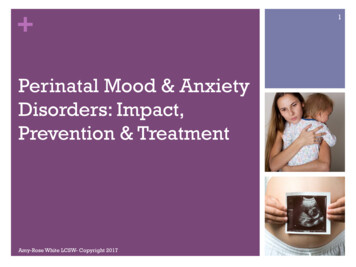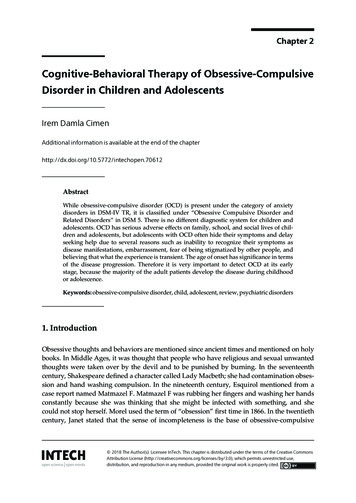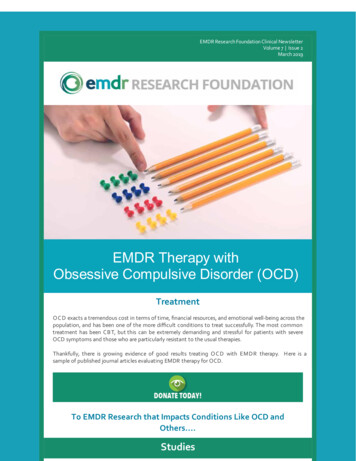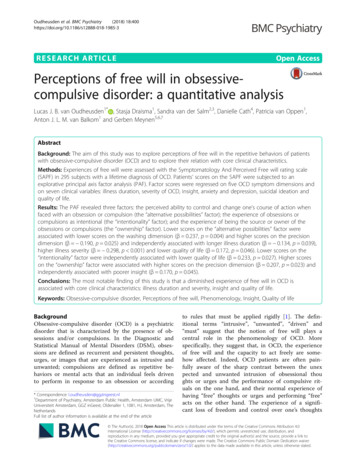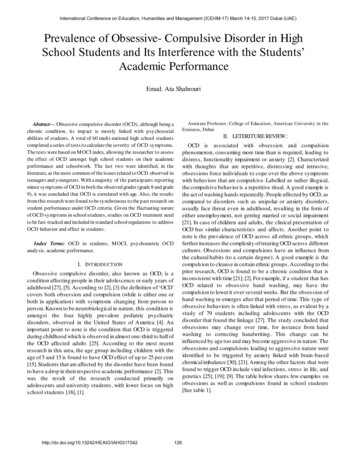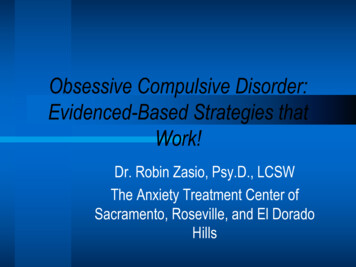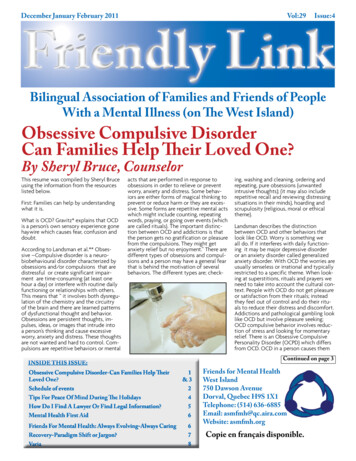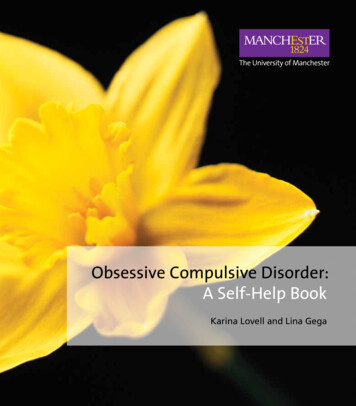
Transcription
Obsessive Compulsive Disorder:A Self-Help BookKarina Lovell and Lina Gega
AcknowledgementsWe would like to thank all the people who have helped us produce this book.In particular, we would like to thank the people with lived experience of OCDwho made valuable contributions to the book and the OCTET research teamat the Universities of Manchester, York, Sheffield and East Anglia:Dr Penny Bee, Dr Peter Bower, Professor Michael Barkham, Dr Sarah Byford, Ms Helen Cox,Dr Judith Gellatly, Professor Gillian Hardy, Ms Nicola Lidbetter, Dr Dean McMillan,Dr Pat Mottram, Dr Chris Roberts, Professor Simon Gilbody, Professor Shirley ReynoldsWe would also like to thank all the people with OCD whom we have talked to over the years.The insights shared with us by these ‘experts by experience’ have been invaluable in shaping theway we have written the book. This book is much better for what we have learnt by talking topeople who actually know what it is like to suffer from OCD. Thank you.
ContentsSection OneWhat is this book about?Section TwoWhat is Obsessive Compulsive Disorder (OCD)?What causes OCD?How does OCD affect you?Understanding how I feelSetting some goalsYour own goalsSection ThreeHow to beat OCDThe 4 golden rulesYour own individual programmeSection Four46810121718202324Frequently asked questions28How do I prevent OCD from returning?30StoriesJaynePaulColin323436Section FiveSection SixSection SevenPersonal diary383
Section One:What is this book about?IntroductionThis book has been designed to help youto manage your Obsessive CompulsiveDisorder (OCD) with support from a mentalhealth facilitator. There are seven sectionsto this manual and although most peoplewill want to work through it section bysection, each section can be read on itsown. In some sections there are exerciseswhich you may wish to do. Section 1 tells you how to use this book withsupport from your facilitator. Section 2 gives you some information about OCDand how OCD affects you. Section 3 explains ways of managing your OCD. Section 4 provides some answers to frequentlyasked questions. Section 5 is about staying well when you aremanaging your OCD better. Section 6 has three stories from people with OCDand how they overcome their difficulties. Section 7 provides some blank sheets if you want tokeep your own personal diary.4We have tried to make this book user-friendly andhelpful. We would welcome your comments on thebook, so please let us know what you think.In this book, we have included advice about using atreatment (cognitive behaviour therapy or CBT). CBTis the recommended ‘talking treatment’ for OCD innational UK guidelines (www.nice.org.uk/CG031).We have also included things that people who haveOCD have told us they have found useful. We hopeyou will find all the information helpful. Most ofall, we hope you will be able to put some of thesesuggestions into practice.Your TeamAt this point we want to reassure you that you arenot on your own. We don’t want you to use the bookwithout support from other people. Managing yourOCD is a team effort – a partnership. So first of all,let’s meet the team. The team includes you, this book,your facilitator and your friends and family.You are the most important person, and only you cantake the steps that are needed to beat OCD. You arethe only person that really knows what this feels likeand are the person who knows what you want to feellike in the future.This book: this book is divided into seven sections,most people will want to work through the booksection by section, but the sections can be read ontheir own. The book is available in written form,electronically or audio CD. It is your choice which formyou would like to use.
We have used stories to illustrate how you can use thedifferent techniques we describe in the book. Thesestories are about people with OCD and show themany different forms that OCD can take. Before wewrote these stories we had talked to a lot of peoplewho had experienced OCD about what should go inthis book. We also asked doctors and other mentalhealth workers for their advice.The people who actually wrote this book are a teamof researchers working in the NHS and universities.Our group includes nurses, psychologists, doctors andhealth researchers. We are all committed to makinglife better for the many people who have OCD.Everything we suggest in this book is something thatwe know someone else has found useful or somethingwe ourselves have found personally helpful. All theexercises are things we would be glad to do ourselves.We would feel very happy recommending them to ourown friends and relatives.Your facilitator is a mental health worker whoknows about OCD and how it can affect people. Heor she has also had some extra training in being aself-help facilitator. Your facilitator will help you makesense of how your thoughts, feelings and behavioursmaintain your OCD. Most importantly, they will helpyou to overcome your OCD. Overcoming OCD can betough. So when you feel discouraged, your facilitatorwill give you advice and offer you support throughany difficult times. If you wish, they can also speak toa friend or relative with you.Facilitators normally see people over a three monthperiod. They will be in contact with you weekly. Theycan see you face-to-face or telephone you. It is yourchoice how you want to organise this, although if youwish an appointment in the evening (up to 8.00pm)then this will usually be via telephone.Think of your facilitator like a personal fitness trainer.If you go to the gym or play sports, fitness trainersdon’t do the actual physical work of getting youfit. That’s up to you. However, the trainer will helpdevise a fitness plan, monitor your progress and keepencouraging you when the going gets tough. Yourfacilitator will act in the same way. They are there tosupport you.Your friends and family: for many of us, our friendsand families are usually the people we are closest to.When we suffer from OCD they are often the first tonotice. They are often involved in our rituals or provideus with reassurance. Sometimes, of course, we try tohide how we feel from those closest to us. We feelembarrassed or we might want to protect them fromhow we feel.We believe that families and friends are very importantto overcoming OCD. Everyone must make their ownchoices as to what they say to whom. You can discussthis book with them; if they would like a copy of thebook just ask your facilitator.5
Section Two: What is OCD?Obsessive compulsive disorder (OCD) is acommon problem and affects about 1 inevery 100 people. It can start at any timebut most often starts in late adolescence.It affects both men and women, youngand old and cuts across different socialbackgrounds and cultures. OCD makespeople anxious and unhappy; it interfereswith everyday activities and can impacton all areas of people’s lives. Unlike somemental health problems, OCD rarelyimproves without treatment.To understand OCD it is important to know whatobsessions and compulsions actually are.Obsessions are thoughts or images, which areintrusive, unwanted, repetitive and usually distressingand cause anxiety. These thoughts are often aboutdirt and contamination, accidental harm, illness,aggression, sex, orderliness and perfection. You maybe interested to know that research has found thatthe content of thoughts is no different for peoplewith OCD than people without OCD. This means thatwe all have these types of thoughts, but people withOCD have them more frequently and consider thesethoughts to be more important and meaningful thanother people do.Compulsions (rituals) are acts we carry out to reducethe anxiety the thoughts provoke. Compulsions takemany forms but the most common are checking,cleaning, repeating things, tidying, putting things inorder, seeking reassurance. We carry out rituals formany reasons: they stop us from feeling anxious; theyreassure us that nothing terrible will happen, or theybecome such entrenched habits that we cannot breakfree from them.If you feel it would be helpful then use the sheet onthe next page to identify your own thoughts andrituals.6
My obsessive thoughtsMy compulsions (rituals)7
What causes OCD?There have been many explanations of whypeople develop OCD. Some have arguedthat it is inherited, whilst others have saidthat life events (such as bereavement orother traumatic event) can cause it. Othershave suggested that it is caused by animbalance of chemicals in the brain andsome think that people with meticulousand perfectionist personalities are moreprone to developing OCD. Different peoplefind different explanations more helpfulthan others.8However, no one really knows what causes OCD andfor many people it is often difficult to pinpoint it toone single cause. Often there are a number of factorswhich lead to its development. Many people like tounderstand why their problems started and you andyour facilitator might want to discuss this. It would behelpful if you could write our own ideas in the box onthe next page. about why you think your OCD startedand what keeps your OCD going.
1. What do you think caused your OCD?2. What do you think has maintained your OCD?9
How does OCD affect you?Many people find that writing down theimpact of their problems on their life is thefirst step towards managing their OCD.Although it can be distressing to list allthese things, writing them down can giveus something to aim for.OCD may affect your home life, your social life, yourwork and your personal relationships with partners,families and friends. The things you identify now arethe things you really want to change. On the nextpage there is a sheet where you can list all the waysin which your OCD impacts or affects your life. Writethem down and try to be as specific as you can. If youfind this difficult the questions below might help you. What exactly do you find difficult? Where and when is this difficult? Are the difficulties associated with specific situationsor people?Here is a copy of the IMPACT SHEET to help youdecide what to write. Ask your facilitator to help youwith this if you are not sure.10
IMPACT SHEETHome – things around your house such as housework, cooking etc.The things to do with home that I find difficult because of my OCD are:Work – paid, self-employment, home working or caring for othersThe things to do with working that I find difficult because of my OCD are:Relationships – family and close relationships with othersThe things to do with relationships with others that I find difficult because of my OCD are:Social activities – being with other peopleThe things to do with being with other people that I find difficult because of my OCD are:Personal activities – doing things alone which you enjoy such as readingThe things to do with personal activities that I find difficult because of my OCD are:11
Understanding how I feelThere is no specific way a person who has OCD feels.It is an individual experience. Nonetheless, there aremany common symptoms which people experience.This section describes a way of understanding OCD.We can think of OCD having three separate butrelated parts. Things we feel physically Things we do excessively (behaviour)or stop/avoid doing Things we think or imagineThings we feel physically – these are the bodilysensations that we have when we are anxious/panicky and can include palpitations (heart racing)hyperventilating (feeling as though you are havingdifficulty breathing), butterflies in the stomach,sweating, shaking, trembling. Some sensations maybe mental such as feeling out of control or detachedfrom reality.Things we do excessively include rituals such asexcessive washing, checking, counting. Things weavoid doing include things or situations that we arefrightened of and we are anxious about; therefore, westop doing these things altogether or we can only dothem if we have a lot of safeguards in place. We oft
knows about OCD and how it can affect people. He or she has also had some extra training in being a self-help facilitator. Your facilitator will help you make sense of how your thoughts, feelings and behaviours maintain your OCD. Most importantly, they will help you to overcome your OCD. Overcoming OCD can be tough.
